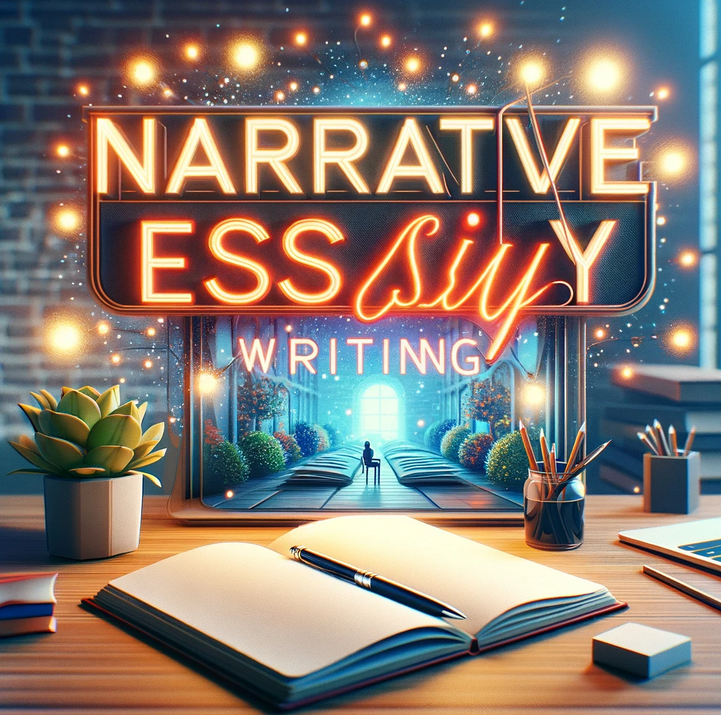Essay Writing Guides
How to write a Narrative essay: Essential Steps, Examples, and Expert Tips


A narrative essay offers a unique platform for storytellers to convey their personal experiences in a structured yet creative format. Unlike the rigid guidelines of standard academic essays, narrative essays thrive on freedom and creativity, allowing the writer to engage their readers with vivid storytelling and emotional depth. This type of essay is about recounting an event and weaving a compelling tale that captures the essence of a personal journey. Whether you are drafting a succinct three-paragraph, 500-word essay or expanding your story into a detailed 1000-word essay, the narrative essay adapts flexibly to the length while maintaining its core requirement: to tell a captivating story.
Navigating through a narrative essay involves more than just laying out a sequence of events; it requires the writer to tap into the narrative building, using descriptive language and a well-written plot to immerse the reader. Often compared with its close cousins, the descriptive essay and the short personal memoir, narrative essays stand out by describing the events and sharing the personal reflections and insights that emerged from those experiences. Ideal for assignments in high school and composition classes at university, these essays also serve as excellent practice for personal statements and other applications, providing a framework to express oneself in a narrative that is both engaging and enlightening.
What is a Narrative Essay?
A narrative essay is a unique form of storytelling where the author narrates a real or imagined story, often with creative liberties taken for enhanced clarity or dramatic impact. Unlike argumentative essays that require taking a stance or analytical essays that involve dissecting texts, narrative essays revolve around crafting a coherent and engaging story. They commonly focus on personal experiences, making them ideal for college applications or assignments that seek to reveal the author’s ability to reflect on and articulate their life events.
The distinctiveness of narrative essays lies in their flexibility to incorporate literary devices like metaphors, similes, and even onomatopoeia, breathing life into the narrative. This freedom allows writers to explore their creative boundaries and express themselves in a way that traditional academic essays seldom permit. Whether the story is factual or fictional, the primary goal remains to draw the reader into the world created by the words, engaging them with a narrative arc that provides insight and emotional resonance. This storytelling approach enhances the reader’s engagement and emphasizes the author’s narrative skill, making narrative essays a powerful tool for personal expression.

A+ in Narrative Essays Await You!
Ready to excel? Let us guide you. Click now for expert essay writing assistance.
5 Steps to Writing a Narrative Essay
Step 1: Choose Your Topic The initial step in writing a narrative essay is to select a topic or to respond to a given prompt. This decision shapes the direction of your story and determines the experiences or events you’ll focus on. Consider how different topics can be molded to fit within a specified word count if necessary. Early in the process, think about the emotional tone and stylistic techniques you might want to use, such as repetition for dramatic effect or ending with a suspenseful cliffhanger. These creative decisions can be adjusted in later drafts, but brainstorming them now can spark innovative ideas for your story.
Step 2: Create an Outline Once you have a clear idea of your topic, develop an outline. This outline serves as a blueprint for your narrative essay, outlining major plot points or personal experiences that you plan to write about. This structure will guide your writing process, helping you to organize your thoughts and connect the narrative smoothly from start to finish.
Step 3: Draft the Narrative Essay Begin writing your narrative essay, using the outline as a roadmap. Remember, narrative essays are more flexible than traditional academic essays, so feel free to use a conversational tone and engaging language. Employ storytelling elements such as dialogue, sensory details, and character development to enrich your narrative. Typically, narrative essays are written in the first person, enhancing the personal connection with the reader.
Step 4: Revise Your Narrative Essay After completing your first draft, take some time away from the essay before revising. This break can provide new perspectives and insights when you return. During revision, evaluate whether your essay achieves the intended emotional impact and adheres to your initial outline. Adjust the flow, clarity, and engagement of your narrative based on this reflection.
Step 5: Proofread and Finalize The final step involves a thorough proofreading session to catch any grammatical or spelling errors and to ensure your narrative is cohesive and polished. After making these minor edits, your essay is ready to be submitted.
Narrative Essay Outline Example
Title: Connected Yet Apart: How Technology Reshaped My Relationships
Introduction
- Hook: Start with a glowing scene or a reflective question that sets the tone, such as recalling a family dinner where everyone was engrossed in their devices.
- Thesis Statement: Summarize the impact of technology on your relationships, highlighting both the gains and losses.
Background
- Setting the Scene: Describe the pre-technology dynamics of your key relationships (family, friends, significant others).
- Initial Attitudes: Reflect on your initial perceptions and attitudes towards technology in communication.
Rising Action
- Introduction of Technology: Discuss the introduction of significant technological tools in your life (smartphones, social media, messaging apps) and their initial effects.
- Changes Observed: Elaborate on specific incidents where technology began changing how you interact with others.
- Example 1: Transition from face-to-face conversations to texting and its impact on your friendship dynamics.
- Example 2: How social media platforms led to reconnecting with old friends but also superficial interactions.
Climax
- Critical Incident: Narrate a pivotal moment that highlights the peak of technology’s impact on your relationships, such as a misunderstanding through text messages leading to a fallout with a close friend.
- Emotional Impact: Express your feelings and the realization of how deeply technology affected your connections.
Falling Action
- Adapting to Changes: Discuss how you and your peers started to adapt to the changes—setting boundaries with technology or finding a balance.
- Resolving Issues: How did you address the issues that arose from technological miscommunications or misunderstandings?
Conclusion
- Reflective Thoughts: Offer insights gained from experiencing these technological impacts.
- Future Outlook: Your perspective on managing technology use in your relationships moving forward.
- Closing Remark: End with a poignant statement or a rhetorical question about the future of interpersonal relationships in a digital age.
Narrative Essay Examples
Expert Tips for Writing a Compelling Narrative Essay
- Choose a Strong Topic: Select a topic that is meaningful to you, as this will make your writing more genuine and engaging. The topic should allow you to express personal insights or transformations.
- Use a Clear Structure: Organize your essay with a clear introduction, body, and conclusion. This structure helps guide the reader through your story smoothly.
- Include Vivid Details: Use descriptive language to create vivid images in the reader’s mind. Sensory details about sights, sounds, smells, and textures can help bring your story to life.
- Develop Characters and Setting: Flesh out characters and settings by describing their physical appearance, behaviors, and emotions. This depth makes your story more relatable and immersive.
- Show, Don’t Tell: Instead of merely telling the reader what happened, show them by using action, thoughts, feelings, and dialogue.
- Use Dynamic Words: Active verbs and precise nouns can make your narrative more dynamic and enjoyable to read.
- Incorporate Dialogue: Dialogue can add authenticity to your narrative and provide more depth to your characters.
- Convey a Theme or Moral: Most narrative essays include a lesson or message. Think about what you want the reader to take away from your story.
- Edit and Revise: Take the time to revise your essay. Look for ways to improve the clarity, coherence, and emotional impact of your narrative.
Narrative Essay Topics: Top 50 Choices for Students
Literacy Narrative Essay Topics for College Students
The narrative essay topics encourage reflection on personal experiences with literacy and literature, aiming to uncover the profound effects that reading and writing can have on an individual’s life.
- Reflect on a childhood book that changed your view of the world. How did it shape your understanding or values?
- Describe the challenges you faced while learning to read or write in a second language. What strategies helped you overcome these hurdles?
- How has storytelling within your family influenced your literacy journey? Share specific anecdotes and their impact on you.
- Can you recall a pivotal moment that ignited your love for reading? Describe the experience and its lasting effects.
- Discuss how a specific teacher inspired your passion for literature and how it influenced your academic or personal development.
- Have you ever encountered a character in a book that profoundly impacted your perspective on life? Explain how and why this character influenced you.
- What role did writing play in helping you navigate a difficult period in your life? Reflect on the therapeutic aspect of writing.
- Explore a time when a literary work challenged your opinions or broadened your perspective on a significant issue.
- Narrate your experience participating in a literary event (like a poetry slam, reading competition, or book club) and how it affected your literacy practices.
- How did an unexpected book or article significantly alter your professional or academic aspirations?
Personal Narrative Essay Topics on Relationships
The narrative essay topics are designed to explore different facets of personal relationships, encouraging deep reflection and personal storytelling.
- How did a childhood friendship influence your personality and life choices?
- Can you recount an experience that significantly deepened your connection with a family member?
- What challenges have you encountered in sustaining a friendship from different stages of your life?
- Describe how a mentor significantly impacted your approach to personal challenges and career decisions.
- Share an instance of betrayal in a relationship: What happened, and how did it change you?
- Narrate a memorable incident where you successfully resolved a conflict with someone close to you.
- How has the relationship with your pet contributed to your mental health and outlook on life?
- What are the key lessons you’ve learned from a past or current romantic relationship?
- Discuss how your relationship with a sibling has transformed as you both have grown.
- Reflect on a time when you had to establish clear boundaries with a friend: what prompted it, and what was the outcome?
Narrative Essay Topics on Education and Learning
These narrative essay topics are designed to evoke reflective and personal responses that explore the individual’s unique experiences in the realm of education and learning.
- What was the most significant insight you gained from an educational experience that occurred outside a traditional classroom setting?
- Can you describe a moment when an educator’s unique teaching style profoundly changed your understanding of a subject?
- How did participating in a field trip or hands-on learning activity profoundly impact your approach to education?
- What challenges have you encountered while trying to juggle academic responsibilities with extracurricular activities?
- Have you ever had an unexpected breakthrough while learning something challenging? Share that “Aha!” moment.
- How has acquiring a skill outside of the conventional curriculum affected your academic performance or interest in a subject?
- Can you recall an instance when a classmate’s viewpoint significantly altered your perception of a topic you thought you understood?
- In what ways has technology played a role in enhancing or complicating your educational experiences?
- What role does creativity play in your learning processes, and how has it helped you in your educational journey?
- Describe a setback in your academic life that eventually led to personal growth or a surprising success.
Personal Narrative Essay Ideas on Reflection on Life
These topics encourage deep introspection and storytelling, allowing writers to explore significant personal experiences and the lessons learned from them.
- How did overcoming a significant obstacle redefine your understanding of strength and perseverance?
- Can you recount a moment of unexpected joy that significantly influenced your outlook on life?
- What insights have you gained from a lifelong friendship that has endured various phases of life?
- How has your understanding of family evolved through personal experiences and relationships?
- Reflect on a time when an act of kindness from a stranger made a profound impact on you.
- What role has empathy played in shaping how you interact with others in your community?
- How have your career aspirations been molded by experiences from your early life or education?
- Can you describe a situation where you had to stand up for your beliefs or values? What were the consequences?
- What lessons have you learned from a cultural or spiritual journey that deeply moved or changed you?
- How has dealing with a critical health issue influenced your philosophy on life and well-being?
Narrative Essay Topics on Hobbies and Interests
The narrative essay topics invite individuals to reflect on how their hobbies and personal interests have not only filled their time but also enriched their lives and personal growth.
- How has your dedication to playing a musical instrument influenced your discipline and creativity?
- Can you share a heartwarming story about how your love for cooking has brought your family or community together?
- What discoveries have you made about yourself through your hobby of painting or drawing in different environments?
- How has your involvement in competitive sports shaped your approach to teamwork and leadership?
- Can you recount a particularly rewarding experience from volunteering at animal shelters and how it has affected your views on animal welfare?
- What unique perspectives have you gained from your interest in reading historical fiction?
- How has your hobby of collecting antiques deepened your appreciation for history and craftsmanship?
- Can you describe a transformative journey sparked by your passion for hiking and exploring remote trails?
- What insights have you gained from your practice of meditation or yoga that have profoundly impacted your daily life and interactions?
- How has your enthusiasm for DIY projects and home improvement taught you about problem-solving and resourcefulness?
Final Remarks
As we conclude our exploration of narrative essay writing, I hope you’ve found inspiration to write essays that not only tell a story but also resonate deeply with your readers. Remember, a well-written narrative essay can transport readers into the heart of your experiences and leave a lasting impression.
If you’re preparing for more complex writing tasks, such as composing detailed research papers, consider exploring our research paper writing service. We’ve helped many students excel in their academic endeavors by offering expert guidance and support. Check out our service today and see how we can assist you in achieving your academic goals and beyond!

Ready to Excel in Your Narrative Essay?
Order now and experience the expertise of our experienced essay writers!
FAQs
What are the five parts of a narrative essay?
A narrative essay typically consists of five parts:
- Introduction: This is where the scene is set, and the main characters and context are introduced. The introduction often includes a hook to grab the reader’s attention.
- Rising Action: Here, the initial events that build up the story’s tension or challenge are detailed. This section sets the stage for the narrative’s central conflict or point of interest.
- Climax: The climax is the story’s turning point, where the central conflict or challenge is faced head-on. It is the most emotionally intense part of the essay.
- Falling Action: After the climax, the falling action deals with the events that result from the main confrontation or turning point, leading towards a resolution.
- Conclusion: This final part wraps up the story, resolving any remaining issues and reflecting on the narrative’s meaning or the lessons learned.
How to start a narrative essay?
Starting a narrative essay effectively involves capturing the reader’s interest from the very beginning. You can begin with a strong hook, such as an intriguing question, a vivid description, an interesting fact, or a compelling dialogue. Setting the tone and establishing the setting early on can also help draw readers into the world of your narrative. It’s essential to introduce the key characters or the story’s premise in a way that promises something interesting is about to unfold.
What are the 5 steps to a narrative essay?
The five steps to writing a narrative essay are:
- Planning: Before writing, outline the main story, characters, setting, and the structure of your essay. Decide on the conflict and resolution.
- Drafting: Start with the introduction, follow through with the rising action, build up to the climax, and then document the falling action leading to the conclusion.
- Revising: Review your essay to enhance the story’s flow, improve expressions, and ensure the narrative is engaging and clear. Focus on adding details that enhance the sensory experience of the reader.
- Editing: Correct grammatical errors, check for punctuation and style consistency, and refine the choice of words.
- Publishing/Sharing: Once the essay is polished, it can be submitted or shared with others, depending on its purpose.
What is an example of a narrative story?
An example of a narrative story could be about a young girl named Lucy who faces her fear of speaking in front of her class. The story begins with Lucy’s struggle with public speaking, highlighted by her anxiety before a big class presentation. The climax occurs during the presentation when Lucy stumbles but ultimately finds her confidence and voice, overcoming her fear. The resolution shows Lucy reflecting on her growth in confidence and the support she received from her friends and teacher, illustrating how personal challenges can lead to self-discovery and change.

